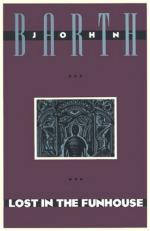|
This section contains 4,161 words (approx. 14 pages at 300 words per page) |

|
SOURCE: "The Nihilist Deus Artifex: The Short Fiction of John Barth," in God the Artist: American Novelists in a Post-Realist Age, University of Illinois Press, 1987, pp. 145-66.
Gorak is an English-born critic and educator. In the following excerpt, he examines Barth's focus on the individual in a godless world in Lost in the Funhouse.
When Barth's Lost in the Funhouse appeared in 1968, critical responses were often sharp. Barth's reviewers have always been tempted to regard each of his books as worse than the last; Lost in the Funhouse, a labyrinthine combination of pop mythology, multiple allusion, and electronic voice games, appeared to invite these very responses. Accordingly, Guy Davenport found the book "thoroughly confusing" while the Book World's critic dismissed it as "blitheringly sophomoric," a verdict echoed by the Library Journal's reviewer, who damned it as "pseudo-Homeric" [Guy Davenport, "Like Nothing Nameable," New York Times Book...
|
This section contains 4,161 words (approx. 14 pages at 300 words per page) |

|


